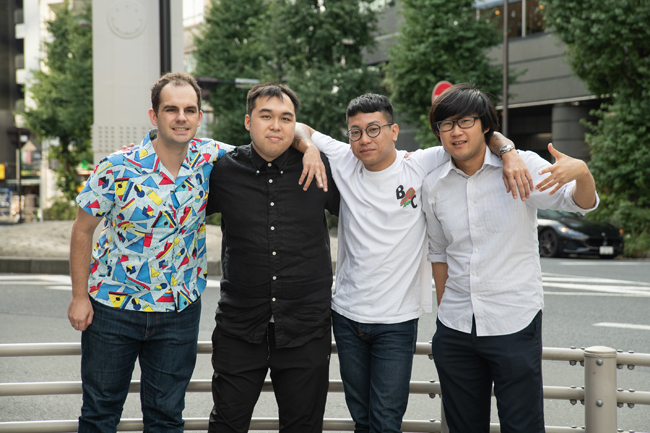Redefining the Relationship Between Asian and Western Music Communities
Patrick: Speaking of global scale, I think this decade has seen a lot of attention fall on "Asian music" in Western spaces, whether that's K-pop or, to a degree, something like 88rising. Yet all these cases tend to find artists from Asia going to the West, rather than anyone paying attention to what is actually happening inside the country. How do you guys imagine that approach could change? How do you foster a community and shift perspectives?
Rezky: I went to this music conference and festival in Taiwan, LUCfest, and we were in this roundtable discussion. They had the idea of building on the momentum generated by the Asian artists that make it in the West. LUCfest attracts a lot of festival owners and they are planning to tour these artists through all of their festivals in Asia. Just to make exposure that could be picked up by the West. I don't know too many specifics, though.
similarobjects: In connection with what you said about everything starting to point toward Asia as a place to observe interesting music, I notice that as well. Every time I'm abroad, I notice that even the music Europeans and other Western people make reference to Asian elements. It's always like Asian scales or instruments, or even synthetic instruments replicating these things. It's funny for me, in the Philippines, to hear people sampling Filipino elements, or things that we normally do. It makes me feel subconsciously like they are looking at us and we are looking at them.
So what is going to happen? In Manila, I'm also a teacher, and I always tell my students that they should be focused on what is happening here. But it's ambitious to undo the legacy of colonialism that remains inside everyone. People praise everything foreign. I tell a lot of my students not to think of ourselves as lesser. It's like the law of attraction: if you think you are lesser, you are immediately placing yourself lower. But if you just do it, you have the mentality that you stand among all the giants, and you'll then attract the same kind of energy as well.
I know there is a strong experimental Asian electronic music movement. Even when you go abroad, people look at you as someone from a place that is exotic to them, and they become more open to you because of that. I think it's just about breaking out of that mold and doing more shows, about doing more interesting projects that show people that there is more. I think it needs to start from Asia. It can't be people from outside trying to take us out. So projects like Bordering Practice would definitely benefit from sparking interest from people in Manila, in Jakarta, or in Japan. Whenever I go on these trips, I tell people how there is such a sick scene here, here, and here. I want them to know more.
tomad: Through this project, I had the opportunity to get to know more and more Asian artists. As I mentioned, that kind of triggered me to look back on my own scene in Tokyo. Today, I know what to expect from the Asian music community. There are individual scenes in cities, and when the right time comes, we can work together. Just because we are Asian, though, doesn't mean we have to force ourselves to work together. It's not "Asia versus the West." It's not a solidarity thing. With the scenes I'm in, we often reach out to European artists if we find something there that catches our attention. It's a great thing that we can work with anybody to create something. I feel we shouldn't get too caught up in geographical proximity. But being aware and knowing one another is very important, because it gives us all more options for collaboration.
Patrick: What's your image of a truly borderless Asian electronic music community?
similarobjects: It would be not thinking about the music as separate. Like we were saying about not focusing so much on the geographical location, but rather looking at it as good music. Or not looking down at it because it is from a certain place.
tomad: I think there are two perspectives. From the artists' perspective, this residency program has allowed us to get together and share knowledge. We could strengthen one another. I think that can continue. The other important perspective is when we create music, we all want to reach as many listeners as we can. Yet people in cities, be it Tokyo or any other city across Asia, simply don't get opportunities to find new music. I'd want to create some sort of platform that would help introduce more music originating in Asia to these audiences. So this is looking at it from a marketing or publicity perspective. I think it is necessary to take things to the next level.

[On August 25, 2019 at FabCafe MTRL]
[More Information]
Boardering Practice Official Website
Bordering Practice and Imaginary Line――The Intersecting Scenes of Electronic Music in Asia
Interview: Patrick St. Michel (Music Journalist) [U.S. / Japan]
Based in Tokyo, Patrick St. Michel is a writer covering Japanese music, pop culture, internet culture and more. His work has appeared in The Japan Times, The Atlantic, Pitchfork and more. He contributed an entry to the popular 33 1/3 music book series on J-pop group Perfume's album GAME.
https://makebelievemelodies.com
Editors: HIROTA Fumi, KASHIMA Moeko (The Japan Foundation Asia Center)
Photo: Kenichi Inagaki
Translation support: Penguin Translation. Inc (KATO Kumiko, Carole Sugiyama)






